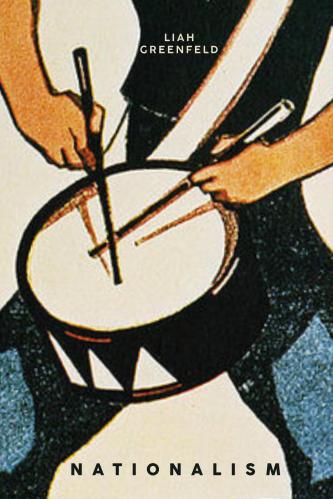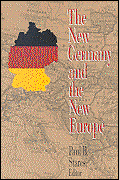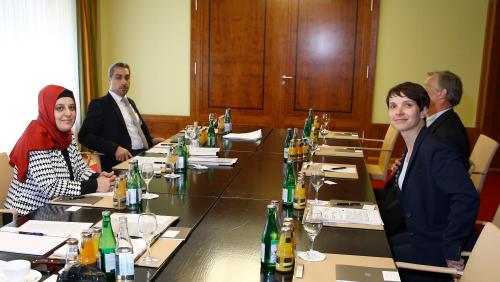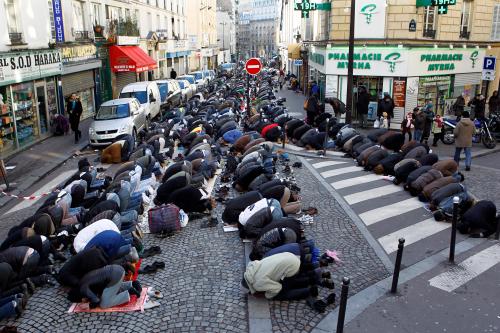This reaction essay is part of the Brookings project—”The One Percent Problem: Muslims in the West and the Rise of the New Populists.” We asked each author to reflect on how reading the other working papers helped them think differently about their own country of focus.
A striking insight emerging from the case studies is just how problematic the term populism is. The working paper on Italy notes that, “although scholarly debates over populism have increased sharply in recent years, they are often fraught with as much confusion about what populism is as why it is growing.” Indeed. Some of the case studies refer to “the radical right.” There is often no clear distinction between populist right and radical right. Both seem to have a negative connotation, with radical right being even more severe in its implicit judgment.
The background and history of “Prairie Populism” in the United States provides an interesting example of how these concepts are often used in a fluid manner. “Prairie Populism” goes back to the 19th century and was largely centered around economic concerns and grievances. It was also rooted in the American Midwestern progressive populist tradition — all a decidedly Democratic and liberal affair but still “populist.” In a word, researchers bring assumptions, and cultural context matters greatly in these matters. Are we observers and analysts able to describe — accurately, clinically — without our own hidden biases shading things? Are we tagging things with warning labels for readers?
Some analysts argue that what we are dealing with in Europe are best described as Left-Right parties. That is, parties that favor a strong role for the state in social and economic affairs, while holding staunch pronationalist, anti-immigrant views. Throughout the case studies, a common thread has to do with voters on the one hand and leaders of populist parties on the other. My country case of Germany underscores a point worth considering.
To formulate sharply: not all Alternative for Germany (AfD) voters are neo-Nazis.
To formulate sharply: not all Alternative for Germany (AfD) voters are neo-Nazis. Or xenophobes for that matter. In my experience, most are not. Some are, true. The large majority of AfD voters, however, can be mostly fairly described in my view as disaffected conservatives, as traditionalists struggling with — or outright resisting — rapid social and economic change. As for the AfD leadership, it’s a hodgepodge. There are conservatives, social conservatives, radical rightists, and pure opportunists and demagogues whose actual ideological agenda remains unclear. In some ways, AfD is a Left-Right party. One might say national-socialist. That’s an expression which in Germany generates far more heat than light, of course, but it fits to some extent.
What about the Muslim piece to all this? Size matters. Austria is a small nation of barely nine million. History and culture matter. Austria is rural, mountainous, traditionalist, and Catholic. One must appreciate the Austria case study for its detail and nuance (with politicians using the marker “Christian” in a subtle yet clearly exclusionary way). That is, “Christian” denotes ethnicity and identity far more than it does religion. The Danish case study notes that Danish right-wing populists use Islam as “a marker of culture, identity and societal difference.” Part of this has to do with Christianity and Islam. A core part, however, is related to the issue of those who belong and those outsiders who do not belong.
What we need in today’s debate is a better, more refined balance between detail and context. So malign nationalists, let’s say and stipulate, are using the moment to whip up xenophobic, anti-Muslim sentiment. These things do indeed exist. These are deplorable and dangerous. However, can another thing be true at the same time? It seems to me that the primary catalyst for many of the problems we are dealing with was Europe’s refugee crisis beginning in the middle of this decade. Led by German Chancellor Angela Merkel, Europe opened its borders, and its arms. The response was noble. The numbers were great. The miscalculation as a result was grave. The refugee crisis fueled Germany’s far-right.
What’s more, the crisis came at a time when across the West a confluence of factors was bringing pressure on publics and political classes alike. Samuel Huntington’s last book, published in 2004, was called Who Are We? The book was about the United States, not about Europe, and focused on issues of culture and identity, not immigration. Unsuccessful wars in Iraq and Afghanistan tarnished America’s image and strained transatlantic ties. The 2008 financial crisis jarred confidence in the stability and durability of democratic capitalism. Russian revanchism began to stir in 2008 with Russia’s invasion of Georgia. Rapid developments in digital technology were bringing promise of a new wave of democratization, but these same technologies are now being co-opted and weaponized by authoritarians to undermine democracies. Deepening cleavages between Left and Right were amplifying online and offline, leading to growing social polarization. By the middle of 2014, Brexiteers were capturing key posts in politics and culture. It was not only in Britain that one could see signs of a new debate about issues of sovereignty and identity.
It was in this context that the refugee crisis erupted in 2015. In many cases, these newcomers, coming mainly from Muslim majority countries, were of backgrounds significantly different from the host country in culture, habit, and behaviors. The misunderstanding and clash of cultures on numerous levels were surely unavoidable. Well-meaning, left-leaning German NGOs conduct workshops for young Afghan men on LGBTQ issues. Receptivity from young Afghans has not been high. History and culture, religion and family and education all matter greatly.
As for the agenda of those populist politicians who lead, many are indeed demagogues. They tap into and manipulate voter opinions and political narratives. But they also reflect something in their respective countries, some of which is problematic and alarming, to be sure. Yet what of those citizens who simply feel unrepresented by mainstream parties, who become politically homeless and seek shelter where shelter is provided? What if Muslims in Europe, suddenly in large numbers, are forcing Europe to grapple with things long in coming? That is, have Europeans themselves evaded their own fundamental questions about identity?
A final point regarding the spectrum we are dealing with. Take the Hungarian case study. Fidesz is one issue, but Jobbik, which occupies political space to the right of Viktor Orban’s party, is as well. Whether for tactical reasons or shift in ideology, it is striking how malleable such a party can be. Like a number of comparable parties, Jobbik has moved from anti-EU positions to an approach aimed at reforming the EU from within.
Are there lessons in this for establishment parties? In order to win back votes can they work harder to sensibly reposition? Can establishment parties tend to the concerns of voters struggling with social change and anxiety over instability without turning to the right ideologically? Establishment parties would do well to consider their own realignment on a number issues. If left-wing parties could move to the center (at least on issues of culture, identity, and immigration), and conservative parties could accommodate more traditionalist views, this would likely take some of the winds out of the sails of insurgent parties. All this would conceivably ease pressure and social tension, and make life easier for Europe’s Muslims, whether immigrants or refugees.
The Brookings Institution is committed to quality, independence, and impact.
We are supported by a diverse array of funders. In line with our values and policies, each Brookings publication represents the sole views of its author(s).







Commentary
How “populist” is the AfD?
A 'Muslims in the West' reaction essay
December 4, 2019